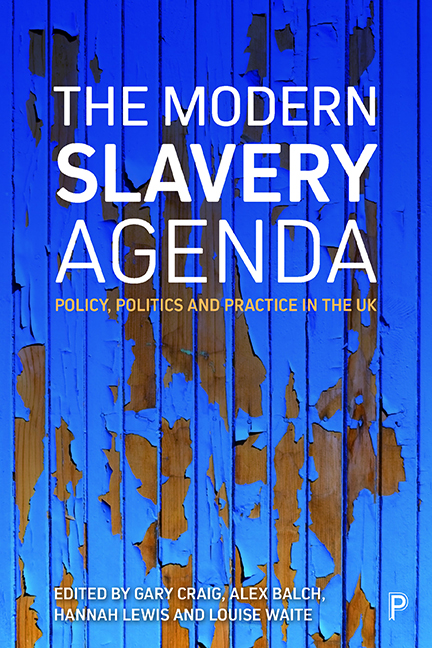Book contents
- Frontmatter
- Dedication
- Contents
- List of tables, figures and boxes
- Notes on contributors
- Editorial introduction: the modern slavery agenda: policy, politics and practice
- one Modern slavery in global context: ending the political economy of forced labour and slavery
- two The UK’s response to modern slavery: law, policy and politics
- three Defeating ‘modern slavery’, reducing exploitation? The organisational and regulatory challenge
- four Class Acts? A comparative analysis of modern slavery legislation across the UK
- five Child trafficking in the UK
- six Human trafficking: addressing the symptom, not the cause
- seven Still punishing the wrong people: the criminalisation of potential trafficked cannabis gardeners
- eight Modern slavery and transparency in supply chains: the role of business
- nine Migrant illegality, slavery and exploitative work
- ten The UK’s approach to tackling modern slavery in a European context
- Index
two - The UK’s response to modern slavery: law, policy and politics
Published online by Cambridge University Press: 20 April 2022
- Frontmatter
- Dedication
- Contents
- List of tables, figures and boxes
- Notes on contributors
- Editorial introduction: the modern slavery agenda: policy, politics and practice
- one Modern slavery in global context: ending the political economy of forced labour and slavery
- two The UK’s response to modern slavery: law, policy and politics
- three Defeating ‘modern slavery’, reducing exploitation? The organisational and regulatory challenge
- four Class Acts? A comparative analysis of modern slavery legislation across the UK
- five Child trafficking in the UK
- six Human trafficking: addressing the symptom, not the cause
- seven Still punishing the wrong people: the criminalisation of potential trafficked cannabis gardeners
- eight Modern slavery and transparency in supply chains: the role of business
- nine Migrant illegality, slavery and exploitative work
- ten The UK’s approach to tackling modern slavery in a European context
- Index
Summary
Research and policy: key influences
The UK government, despite its increasingly frequent assertions, has not been a world leader in terms of policy development in relation to modern slavery. Policy has actually developed in a fashion that is piecemeal, uneven and inconsistent. Moreover, different governments have been resistant to making policy more robust, and more victim-centred.
The UK's policy approach has also been shaped by different understandings of the problem. As Bacchi (1999) points out, governments can interpret issues in diverse ways, resulting in different solutions. I will explore three approaches underpinning policy and the agencies tasked with implementing the policy. The first is that modern slavery is defined as a crime and, as a result, requires a criminal justice response. Thus, law enforcement agencies play a central role in identifying victims and investigating cases, and the judicial system in holding offenders to account. The second is that modern slavery is considered an abuse of human rights and has to be rectified by meeting victims’ needs, restoring dignity and enabling recovery and reintegration. In the UK, many non-governmental organisations (NGOs) have established appropriate services to meet short- and medium-term needs, supplemented by statutory provision. The third approach identifies modern slavery as arising from the abuse and exploitation of labour, which may be inherent in neoliberal economic policy and in changes in employment practices, such as growing demand for cheap and flexible labour (see Chapter Ten). This perspective suggests the need for a stronger regulatory framework, protecting labour rights and promoting the welfare of workers, as well as an enforcement arm ensuring that employers and labour suppliers comply with regulations.
Various factors have influenced policy development in relation to modern slavery in the UK since 2000. These include international Conventions, obligations arising from membership of regional organisations, advocacy by pressure groups and think tanks, evidence provided by research, action taken by influential individuals, responses to scandal, and the identification of human trafficking and forced labour as social problems. For example, the role of United Nations (UN) and International Labour Organisation (ILO) Conventions and the UK's membership of regional bodies – the Council of Europe and the European Union (EU) – in shaping UK policy are significant, alongside the Group of Experts on Action Against Trafficking in Human Beings (GRETA) and the Anti-Trafficking Monitoring Group (ATMG) (see, eg, Chapter Four), which has monitored the UK response.
- Type
- Chapter
- Information
- The Modern Slavery AgendaPolicy, Politics and Practice in the UK, pp. 47 - 74Publisher: Bristol University PressPrint publication year: 2019
- 1
- Cited by

